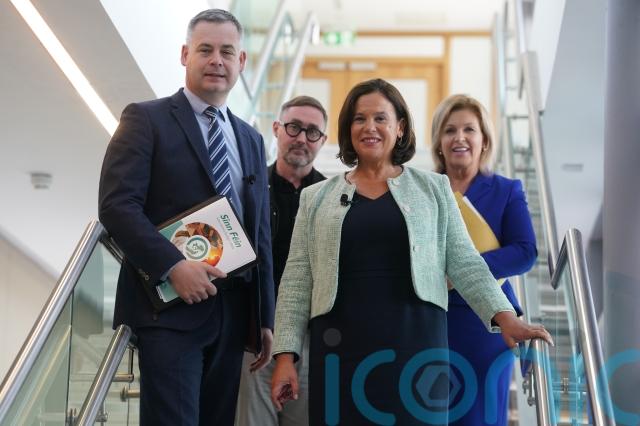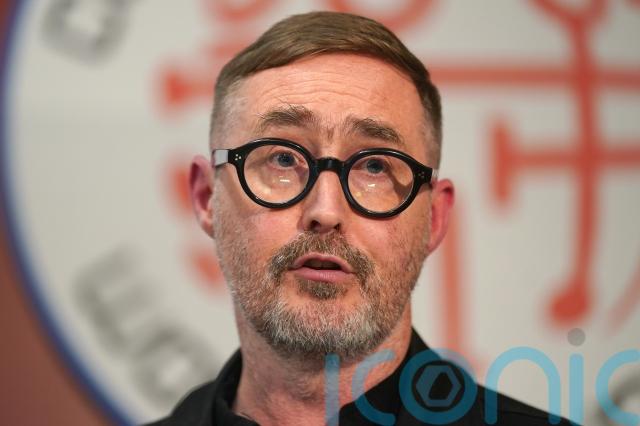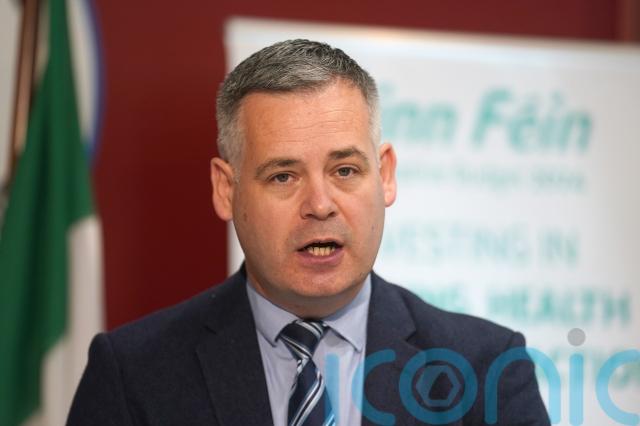
Sinn Fein is promising to deliver 21,000 social and affordable homes next year at an additional cost of 1.4 billion euro, according to its alternative budget.
The main opposition party, which has been preparing itself for government, launched an alternative budget document on Wednesday that put an emphasis on housing and the cost-of-living crisis.
The total alternative budget for next year is costed at 6.8 billion euro, with 3.7 billion allocated to pre-committed spending. The cost-of-living package is put at 1.35 billion.
Sinn Fein would build 13,000 social homes next year it said, above the Government’s target of 9,300 homes, and provide 8,000 affordable homes, above the Government’s target of 4,400 for next year.

Sinn Fein leader Mary Lou McDonald said the budget aimed to appeal to “anybody who needs a house”.
“Anybody who’s a sofa surfer, anybody who is living in the box room of their ma or da or grandparents’ house, anybody who is getting hammered with extortionate rent, people who are struggling and who each week doing their groceries, trying to meet their bills,” she said.
“I think it has a particular resonance for people who are younger, who are coming along and who haven’t yet got their foot on the property ladder.”
Among the other housing policies the party has is to put a month’s rent back in people’s pockets and a ban on rent increases for three years, both at a cost of 200 million euro.
It also plans to abolish the help-to-buy scheme, as it drives up house prices according to its TDs.
Sinn Fein housing spokesperson Eoin O Broin said that according to independent analysis, 40% of the funding made available through the scheme went to people who did not need it to purchase a home.
“With respect to the Help-to-Buy, it very clear pushes up house prices, it makes it much much more difficult for people to purchase a home.
“It would be our intention, if in government, to end that scheme in our first budget.
“But let’s be very clear, you cannot tackle a public housing crisis if you keep pumping developer-led subsidies and pushing house prices up. The problem is house prices are too high and they have to come down.”

Under its cost-of-living package, Sinn Fein is pledging to cut electricity bills by reimbursing suppliers, part-funded by a windfall tax that would be “strengthened and extended” and at a total cost of 408 million euro for January-April 2024.
It also committed to reducing excise duty for petrol and diesel, said it would not proceed with the carbon tax increase, and would help mortgage holders by covering 30% of increased interest costs or up to 1,500 euro per household, benchmarked against June 2022.
The Sinn Fein budget also pledged to increase weekly welfare rates by 15 euro, and increase core pension rates by 10 euro.

Sinn Fein’s public expenditure spokesperson Rose Conway-Walsh said the alternative budget also showed “how serious” the party was about climate change.
“It’s reckless in the extreme to not increase investment in the green transition,” she said.
She added that the party had to ensure that people with disabilities were not further affected by the cost-of-living crisis.
The party’s health spokesperson David Cullinane and climate spokesperson Darren O’Rourke were present at the launch.
Asked about the similarities in some policies being floated by the coalition government, such as reducing childcare fees and mortgage interest relief, Sinn Fein’s finance spokesperson Pearse Doherty said it was still unclear what the Government planned to do across various measures.
He suggested that although giving renters a month’s rent was similar to the Government’s rent credit, as the party had “moved” the coalition’s position, he said they also planned to freeze rents for three years.
“We’re planning the biggest level of investment ever in the history of the state in terms of housing – it’s 21,000 homes.
“We’re planning to support renters by putting a month’s rent back into their pockets. Yes, we’ve moved government in relation to that policy, but there’s no point giving money to renters in one hand if the landlord’s going to take it from the other hand. The second part of that proposal is we’re going to freeze rent increases for next three years.
“The retrofit programme is far from tinkering. Talk to people in any community across across the state – most families are locked out of this because what the government doesn’t understand is they don’t have 25,000 or 30,000 euro to actually pay their contribution.
“That’s why our proposal which is about a tiered support supports families with different levels of incomes right up to 130,000 euro with greater supports to be able to actually retrofit their homes and also to be able to put in heat pumps.”
Ms McDonald added: “I think one of the big differences in the Sinn Fein approach is the manner and the scale of investment.
“We know that you cannot rely on windfall taxes for current expenditure – and note, we are not doing that, we’re absolutely not doing that – but we know that the largesse that the state has and the Government has access to has to be really smartly invested.
“In the case of housing and health, there’s no time to be lost and this business of sitting back and hoping that the situation will improve, which seems to be the approach of the current government, isn’t one that we subscribe to.”
The government is to be announced next Tuesday October 10 by Minister for Finance Michael McGrath. The Cork South Central TD will be the first Fianna Fail minister to unveil a budget since 2010.
Subscribe or register today to discover more from DonegalLive.ie
Buy the e-paper of the Donegal Democrat, Donegal People's Press, Donegal Post and Inish Times here for instant access to Donegal's premier news titles.
Keep up with the latest news from Donegal with our daily newsletter featuring the most important stories of the day delivered to your inbox every evening at 5pm.